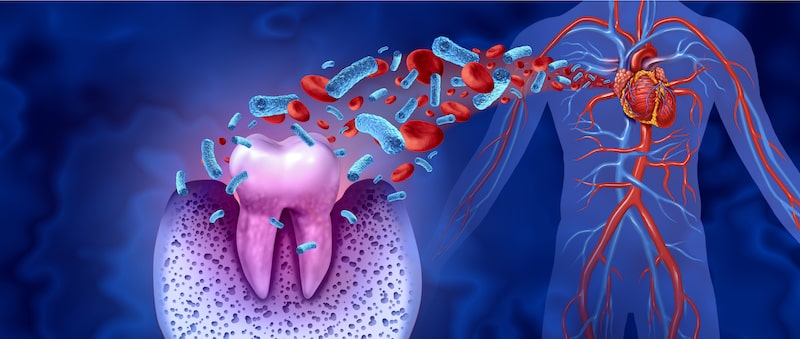8 Ways Gum Disease Can Jeopardize Your Overall Health
3 Minute Read:
Having an appropriate oral health routine, practicing it daily, and seeing the dentist regularly are vital to keeping your teeth and gums in good condition.

However, the threat poor oral health poses is not limited to your mouth.
If you are not keeping your teeth and gums clean by brushing twice and flossing at least once daily, then you are asking for periodontal (gum) disease to develop, putting your overall health at risk.
How Does Gum Disease Affect My Overall Health?
Without proper oral health care, your mouth becomes the perfect habitat for a potent strain of bacteria to make its way into your bloodstream or be inhaled into your lungs.
First, these bacteria colonize the gums, where they start deteriorating the gums, leading to periodontitis. This condition can cause tooth sensitivity, chronic bad breath, tooth loss, and jaw bone damage.
Eventually, this bacteria becomes so prevalent that it cannot be contained in the oral space and enters other parts of the body. Some of the conditions linked to periodontal disease include the following:
1. Heart disease – Long-term periodontitis can lead to atherogenesis (the build-up of plaque in your arteries). Individuals with severe gum disease double their risk for heart disease.
2. Respiratory illness – Data suggests that when oral bacteria are abundant, they can be inhaled and may be at the root of lung infections when gum disease is also present.
3. Diabetes – Research has determined that periodontal disease impacts metabolism and can increase the risk of developing pre-diabetes. On the other hand, those with type 2 diabetes who are successfully treated for periodontitis can reduce their levels of oxidative stress and better manage their condition.
4. Stroke – Recent studies have shown that if you are missing several teeth or have lost significant bone mass in your jaw, your risk of stroke increases. Severe periodontitis is also a risk factor for atherosclerotic plaques (a combination of inflammation and plaque build-up), a known cause of strokes and heart attacks.
5. Kidney disease – The loss of teeth has also been linked to chronic kidney disease, which affects blood pressure and bone health, and can lead to kidney failure and heart disease. Statistics show that adults with no remaining natural teeth are at increased risk of developing chronic kidney disease.
6. Dementia – Scientists are working to confirm a theory that chronic periodontal disease quadruples the risk of Alzheimer’s disease. Other studies have already linked the two conditions, but if this new science is confirmed, the early treatment of periodontal disease may reduce the risk of Alzheimer’s disease.
7. Premature labor & low birth weight – Periodontal disease increases the chances of delivering a preterm baby or one with low birth weight. If you are experiencing symptoms of gum disease while being pregnant, seek special care from a periodontist during this time. Studies have confirmed that receiving treatment for gum disease during pregnancy can reduce the risk of preterm labor or delivering a newborn with a low birth weight. People with diabetes who are pregnant are also more prone to severe gum disease.
8. Mental health issues – While it’s true that stress and anxiety can affect your physical health, the relationship between gum disease and mental health problems works in reverse. Stress, depression, and anxiety increase the levels of the hormone cortisol, contributing to periodontal disease. Studies have also shown that poor gum health can cause a rise in mental health issues.
How to Prevent Gum Disease
Your proper at-home dental routine, including brushing and flossing, the daily use of an ADA-approved mouthwash, along with regular visits to your dentist for checkups and cleanings, is the most effective way to prevent periodontitis.
Interested in Learning More?
If you are concerned about periodontal disease or want to have your teeth cleaned, call Dr. Salamati’s Beverly Hills periodontal practice at 310-275-1090, or contact us online.
You can schedule a consultation to assess your gum health, then set up regular visits and cleaning appointments to help ensure your ideal oral health.
